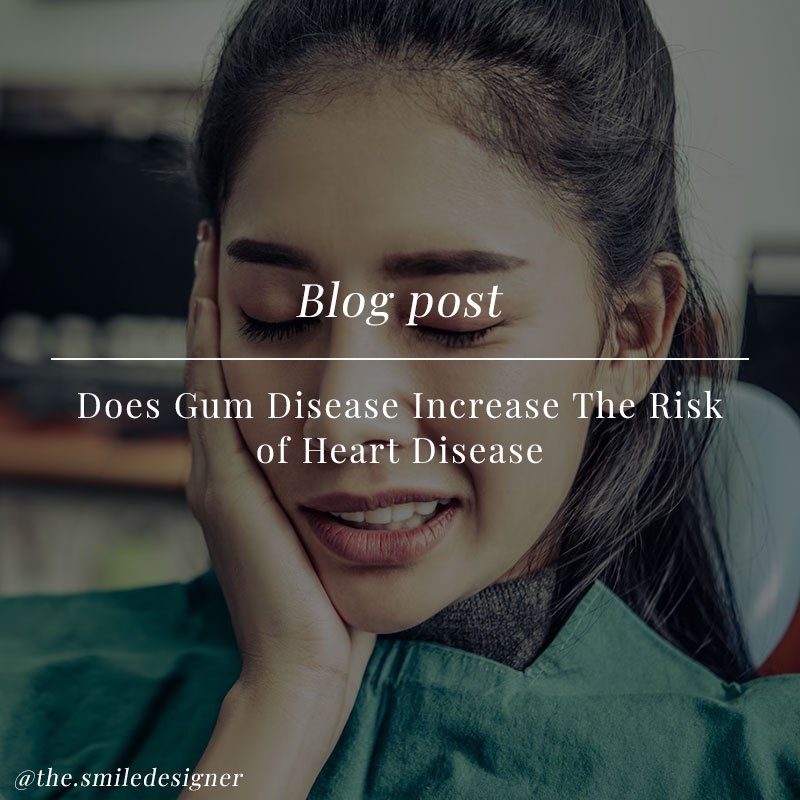Gum Disease
Does Gum Disease Increase the Risk of Heart Disease
Gum disease is a common condition that affects the health of the gums and bones supporting the teeth. It is caused by the build-up of plaque and tartar, leading to inflammation and infection in the gums.
The severity of this oral health concern can range from mild gum inflammation to severe bone and tissue loss. While gum disease is primarily a dental health concern, recent research has suggested a potential link between it and congestive heart failure.
How Are Heart & Gum Disease Related?
Studies have shown that individuals with gum disease are more likely to develop congestive heart failure than those without it. The link between these two conditions is related to the inflammation caused by this oral health concern, which can spread throughout the body and increase the risk of heart disease.
The bacteria that cause gum disease can enter the bloodstream and contribute to the formation of clots, which can increase the risk of heart attacks and strokes. Individuals with this oral illness are more likely to have other factors that increase their risk of heart disease, such as high blood pressure, high cholesterol, and smoking. These risk factors can compound the effects of gum disease on heart health.
Who is at Risk?
Anyone can be at risk of heart failure due to gum disease, but certain groups of people are more vulnerable. These include:
01
Smokers
Smoking can increase the risk of both gum and heart disease.
02
Diabetic individuals
People with diabetes are more prone to gum issues and have a higher risk of developing a heart condition, making them vulnerable.
03
A family history of heart disease
If someone has a family history of heart disease, they are more likely to develop the condition themselves. The presence of gum disease compounds the risk.
04
People with weakened immune systems
People with weakened immune systems, such as those undergoing chemotherapy or with HIV, are more susceptible to gum disease and have a higher risk of developing heart disease as a result.
05
Older adults
As people age, they are more likely to develop both oral health issues and heart disease, putting them in the vulnerable category.
Maintaining good oral hygiene, regular dental check-ups, and managing any underlying health conditions are essential to reduce the risk of gum and heart disease risk.
Symptoms of Gum Disease
A range of noticeable symptoms can range from mild to severe. The early stages may not cause noticeable symptoms, but as the condition progresses, it can lead to more noticeable signs. Some of the common signs include the following:
01
Bleeding gums
When brushing or flossing, if you notice that your gums are bleeding, this can be a sign you have an oral health concern.
02
Swollen or red gums
Swollen or red gums are another common sign and need treatment by your family dentist.
03
Receding gums
When the gum tissue pulls away from the teeth, exposing more of the tooth or roots, it needs dental intervention.
04
Loose teeth
If your teeth are loose, it may be a sign of advanced gum disease and a loss of the supportive tissue and bone structure around them.
05
Persistent bad breath
Bad breath that doesn’t go away with brushing or mouthwash is a common symptom.
06
Pain when chewing
Pain or discomfort when biting or chewing can be another symptom for some patients.
If you experience any of these symptoms, you must consult your dentist to determine the cause and seek appropriate treatment. Early treatment can help prevent the progression and reduce the risk of complications, such as tooth loss and heart disease.
Preventative Measures
Preventing gum disease starts with good oral hygiene practices. Our dentists recommend the following to keep on top of your oral hygiene:
- Brush teeth at least twice a day with fluoride toothpaste.
- Floss daily to remove plaque and food particles between teeth and gum line.
- Use an antiseptic mouthwash to kill harmful bacteria and freshen your breath.
- Limit sugary and acidic foods that can cause tooth decay and gum disease.
- Visit The Smile Designer regularly for cleanings and check-ups.
- If you use tobacco products, quit. Tobacco use can increase the risk of oral health concerns.
- Keep dental appliances clean, such as dentures, bridges, and braces.
Following these simple steps can help maintain healthy gums and prevent gum disease.
How to Access Dental Care for Gum Disease
Accessing dental care for gum disease is an essential step in managing and treating the condition. The first step is to schedule an appointment with your Smile Designer family dentist, who personalises in treating various oral health concerns.
It’s paramount to provide a complete medical and dental history, including any previous treatment for gum disease, to your dentist. This information can help the dentist assess the extent of the issue and determine the best course of treatment.
On diagnosis, your dentist will provide you with treatment options which may include a deep cleaning, gum surgery, or other procedures. For positive outcomes, it’s essential to follow the treatment plan prescribed by the dentist, including any additional appointments and follow-up care, and to practice good oral hygiene to help manage and prevent further issues.
By seeking prompt treatment, you can help maintain good oral health and prevent gum disease from becoming more severe. Book online and take charge of your oral health today.































